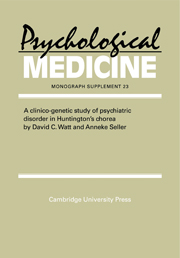Summary
The opening paragraph of Caine & Shoulson's (1983) study of psychiatric syndromes in Huntington's chorea states that ‘Huntington's disease presents a unique opportunity to investigate the development and evolution of psychopathological disorders. As a fully penetrant genetic disorder that can be diagnosed with great certainty, it provides an investigative setting seldom available to researchers studying “functional” psychiatric syndromes. The presence of an abnormal movement disorder and a positive family history provide “external” validating factors. Certain diagnosis is not in question.’ The cogency and relevance of this statement has been reinforced by the advent of a test for distinguishing the presence of the gene for Huntington's chorea in asymptomatic carriers (Gusella et al. 1983). The present study is an attempt to take this opportunity.
HUNTINGTON's CHOREA
Sydenham in 1686 distinguished chorea from other movement disorders (Sydenham 1848— 1850) and about two hundred years later, in 1872, Huntington separated a sub-group of chorea, now named after him, by distinguishing four definitive features. It is hereditary, progressive, has an onset in adult life and ‘shows a tendency to insanity’. Cerebal pathology, subsequently added to these features, was slowly delineated but not established as a diagnostic factor, by Dunlap, until 1927. It has the advantage of being diagnostically unequivocal, but was accessible only by post mortem examination until recent methods of imaging were introduced. As with most genetic diseases during this period there was little opportunity for therapeutic intervention and effort was directed towards assessing the scope of the problem and its public health implications, as indicated by the considerable number of epidemiological studies of Huntington's chorea in which a population exceeding 1 million was surveyed (Panse, 1942; Bell, 1948; Pearson et al. 1955; Kishimoto, 1957; Parker, 1958; Read & Chandler, 1958; Wendt et al. 1959; Heathfield, 1968; Bolt, 1970; Wallace, 1972; Wallace & Parker, 1973; Myrianthopoulos, 1973; Mattsson, 1974a; Stevens, 1976; Harper, 1979; Hayden et al 1980; Walker et al. 1981). These constantly give evidence of the ‘tendency to insanity’ which made such a strong impression on the young George Huntington whose father and grandfather had studied the same families.
PATHOLOGY
Huntington's chorea is a dominant hereditary degeneration of the brain, prominently of the basal ganglia but also affecting the cortex and other parts.
- Type
- Chapter
- Information
- Publisher: Cambridge University PressPrint publication year: 1994
- 2
- Cited by



